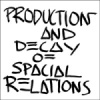 While Z'EV has been performing since the 1970s, this emerged back in 1981 on Backlash Records as his first studio album. To celebrate the 25th anniversary of its release, German-based label Die Stadt has reissued it as a limited CD, housed in the original LP-sized packaging along with a hand-made insert.
While Z'EV has been performing since the 1970s, this emerged back in 1981 on Backlash Records as his first studio album. To celebrate the 25th anniversary of its release, German-based label Die Stadt has reissued it as a limited CD, housed in the original LP-sized packaging along with a hand-made insert.
In many respects, this was the album that initiated his launch into the forefront of the ‘industrial music’ revolution, a trajectory that has culminated in his being regarded as one of the pioneers of the genre; it could almost be said that he was responsible for initiating a great part of the ‘industrial music’ impulse itself. He is also credited with introducing the tribal element into the genre’s repertoire, perhaps in an effort to imbue it with a much more visceral and authentic voice, if not a species of a back-to-basics aesthetic. These facets of his music are readily apparent from even an initial hearing of Production and Decay, the tribal impetus especially being to the fore in many of the pieces, the tensions being emphasised by the friction exhibited by the ‘primitive’ rhythms created using metallic and non-natural percussive sound sources, part of the Western technological palette so to speak. Given also that this was recorded over a period of two days (May 12th and 13th, 1981) and also given the state of recording technology at that time as compared to the present, a frantic immediacy and rawness are the hallmarks here, as well as a sense of the shambolic, cluttered, and unpolished, a distinct antithesis to the kind of creations of the almost ubiquitous laptop artist of today. I particularly felt, especially on the original closing track “Ook Uit,” a driving preternatural impulse, a kind of supernatural, shamanic compulsion that directed the hands of the creators, almost that Z’EV and cohorts were conduits through which something else was speaking.
Twenty-five years after the fact and things have moved on for Z'EV, in terms of aesthetic and philosophical development, and most especially in the sphere of technology, defined here by six recodings of the original songs, collectively entitled Reproduction and Decay of Spatial Relations (note also the different spellings of spacial/spatial). These I found to be somewhat of a disappointment, principally because the power so obviously and openly displayed on the original recordings was conspicuously absent—the ‘spirit’ of the original had been leached out of it. The danger was always that putting the two sets of recordings right next to each other would only magnify all the inherent differences spectacularly, and so it has proved—certainly to my ears I didn’t get the same frisson of excitement and energy from the re-imaginings as I did the originals. Granted, in a different context, i.e. had I been asked to just review the second set on their own, then indubitably I would have enjoyed the pieces in their own right. Even noting the fact that I was disappointed by the remixed set of six songs, as a document of change and development born of experience spiritually and technically, I won’t deny that this possesses an authority and legitimacy all of its own.
In addition to the ‘recodings’, the first 500 comes with a bonus CD, containing three tracks of archive material originally recorded on tape cassette, entitled That Was The Year That Was What It Was and accompanied by all the sound quality issues inherent in the medium. As is pointedly emphasised in the press-release, ‘... cassette was THE ubiquitous storage medium...’ back then, famously contributing to the flow of information in closed societies such as the ‘samizdat’ cassette culture in Soviet Russia. As such then, the quality on here does leave something to be desired, but leaving aside our digital-age prejudices for a moment, these can indeed be seen as documents of an age where all this was considered to be somewhere on the cutting edge and so deserve our consideration and attention. The performances featured are: “The sound of the light of metal for Jackson Mac Low” (a ‘wild-style’ Z’EV performance at the Madison Theater, NYC, 6th December 1982) and “element/L,” culled from the Wipe Out sessions recorded in 1982, also by Z’EV. Also included is “Past Todays” by UNS, recorded 24th May ’82, and featuring vocals by the Sha’ul Z’EV persona. As indicated, the quality is nowhere the best; that said, these recordings are very noteworthy in their own right and, as is also pointed out in the same press-release, these sound documents do indeed deserve to be heard.
samples:
Read More

